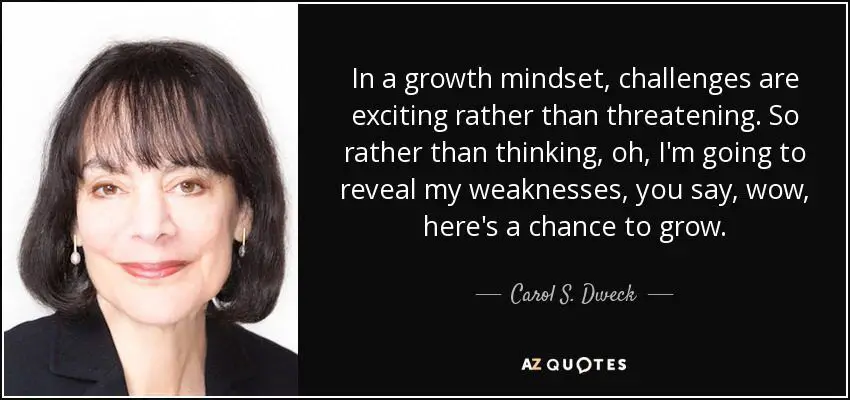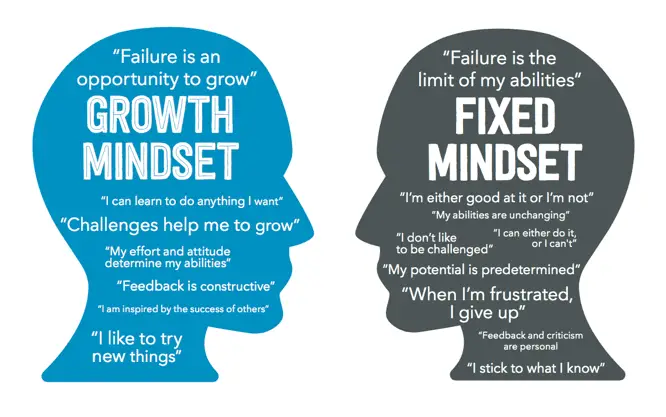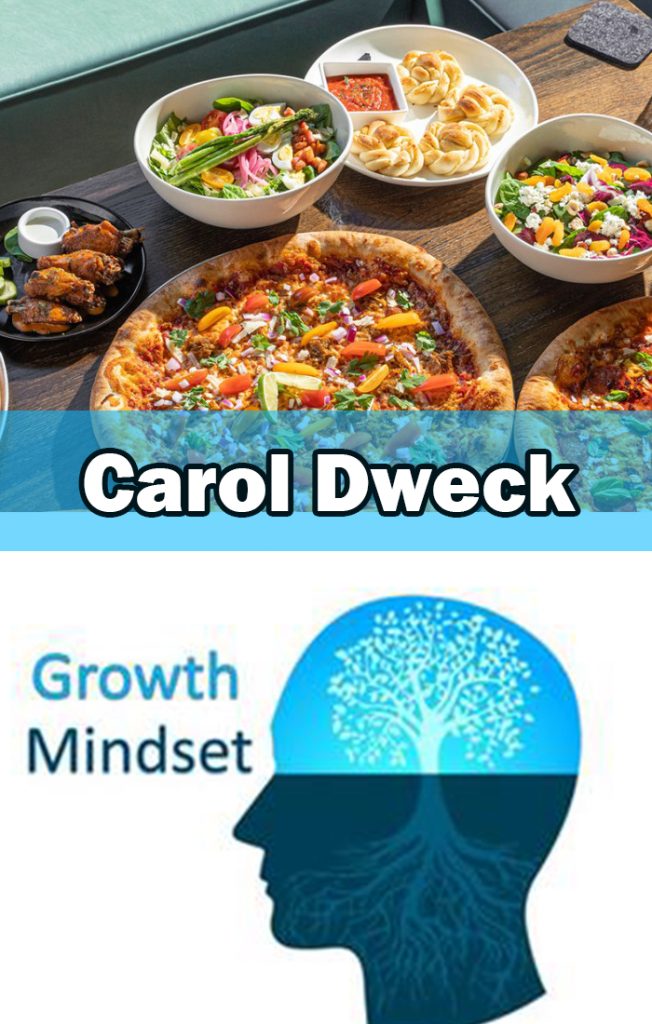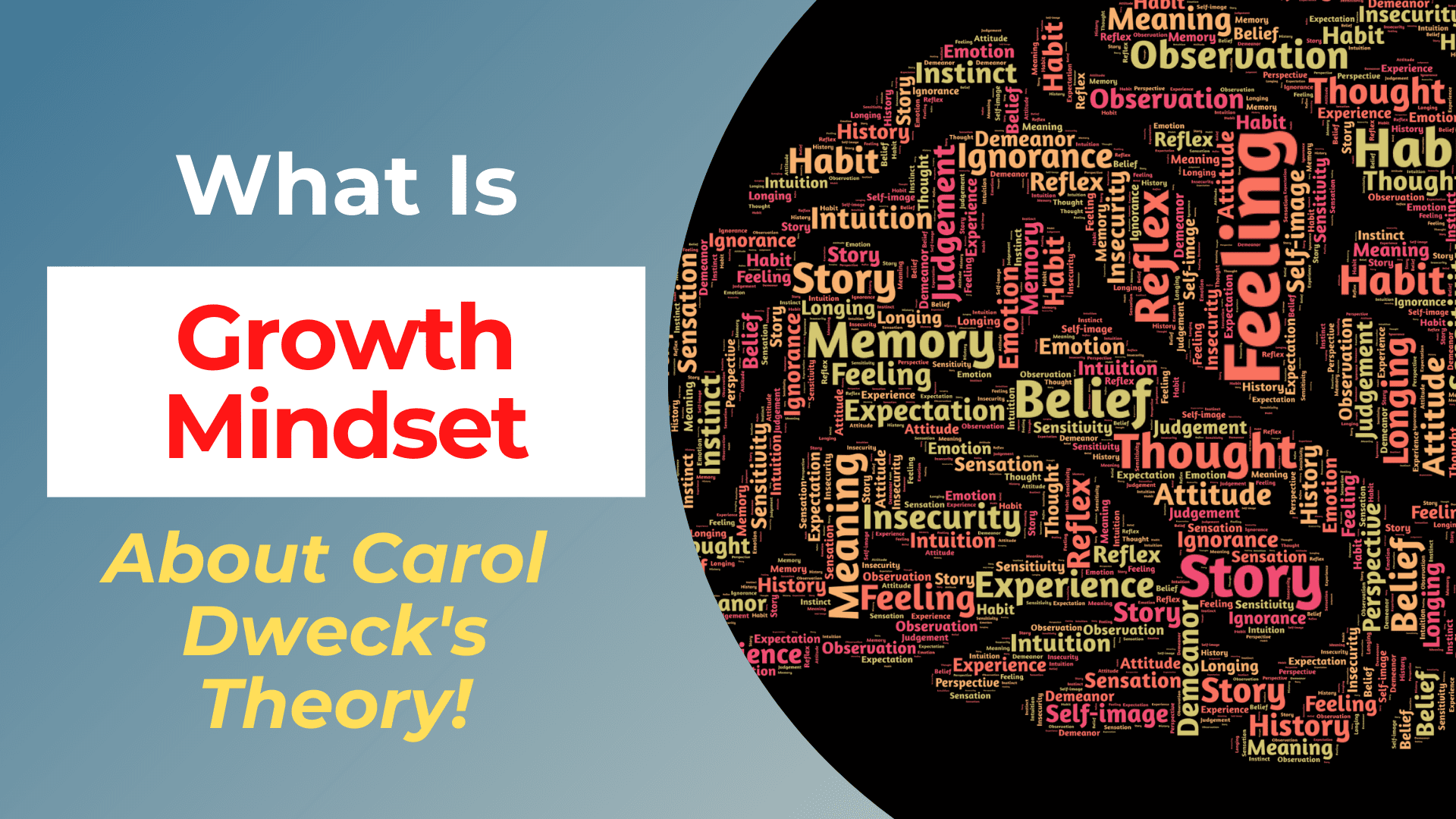Carol Dweck is a psychologist at Stanford University and author of the growth mindset theory.
Here’s a great growth mindset quote: “Brain cells that fire together, wire together” – Dr. Carol Dweck.
Growth mindset is the idea that growth occurs when people see their abilities as malleable rather than fixed.
The growth mindset concept is used in many different fields including education, business and parenting.
Binge eating is no different.
If you think you can’t stop bingeing for whatever reason (genetics, trauma, past failures, etc.) then you are seeing your abilities as ‘fixed’.
With a fixed mindset like this, you won’t be able to overcome bingeing..
To overcome all struggles in life including bingeing, you must have a growth mindset!
In this blog post we will discuss what growth mindsets are and how they work. Plus we also talk about five qualities of growth mindsets and how they relate to bingeing.
How does Carol Dweck define a growth mindset?

Carol Dweck says a growth mindset is when people believe their abilities are malleable rather than fixed.
What does Carol Dweck mean by malleable?
Malleable means changeable. Your behaviors can change. So can your belief systems. And so can your abilities.
Do you believe your behaviors, beliefs and abilities can change? If so then you’ll be able to overcome anything in life!
Growth mindset people believe they can get smarter and better at anything if they practice and learn. Because of their mindset, they don’t give up and put the work in to make improvements.
These beliefs influence how these people try challenges, view feedback and respond to failure.
In a nutshell, a growth mindset is the idea that you can improve yourself if you put in the effort!
Growth mindsets are empowering because they give people control over their lives! Instead of being “fixed” you can grow!
What’s the opposite of a growth mindset? A fixed mindset!

Carol Dweck’s growth mindset theory is the opposite of a fixed mindset.
What does a fixed mindset mean?
A fixed mindset means that people believe they are born with a certain level of intelligence, physical traits and other abilities.
In this mentality you either have it or don’t – there’s no growth involved!
Individuals who fall into this category see their skills as fixed. Not malleable or changeable at all.
Fixed mindset people think that talent alone creates success, without effort. They were born with talent or not. This implies that nothing can be done to change one’s level of ability.
According to growth mindset theory, you won’t succeed if you think abilities are fixed!
Fixed and Growth Mindsets
A growth mindset encourages people to continue learning and improving themselves. No matter how great or small their accomplishments!
Whereas someone with a fixed mentality believes that they cannot change who they are. Regardless of what efforts they put in!
Can you be both growth minded and have an eating disorder like bingeing?
People can have growth mindsets while still experiencing challenges such as binge eating. A growth mindset doesn’t guarantee anything.
It means you believe your abilities aren’t ‘fixed’. So there’s always room for improvement if you invest energy into practicing.
Plus, you can have a growth mindset in some areas of life but a fixed mindset in other areas.
Many people I work with are talented in their careers. They are productive, strong, caring people who are highly intelligent.
But despite having a growth mindset in many areas of their life, with bingeing they are stuck in a fixed mentality.
Why? Shame, in a nutshell. They lack compassion towards themselves, get stuck in shame and can’t escape bingeing.
One idea behind the Eating Enlightenment community is that if you connect with other people who are struggling in a private, safe setting then you can more easily overcome shame and tap into the power of growth mindset!
Be a growth mindset means that you believe your ability, whether it be bingeing or anything else, can change with effort and practice. Yes, even bingeing!
Whereas a fixed mind set believes that you cannot do things if they’re outside your comfort zone.
Question: with bingeing, are you a growth mindset person or a fixed mindset person?
What are the five characteristics of growth mindsets?
The five key characteristics of growth mindset according to Carol Dweck’s research are:
- Growth is possible with effort and practice.
- You can learn from mistakes.
- Challenges are opportunities for growth and learning, not threats (and thus not discouraging).
- Ability is developed through consistent hard work over time (not a result of innate talent or intelligence.)
- Intelligence isn’t ‘fixed’ – it grows like muscles do when you exercise them regularly.
If you think about your life up until now… would this be an accurate description? Is ability something we either have or don’t?
Or is ability something we develop over time with effort and practice?
How do you think growth mindsets differ from fixed mindsets, if at all?
Growth Mindset vs Fixed Mindset:
The central difference is that growth mindsets believe that abilities can be developed. While fixed mind-sets believe that talents are innate.
An example growth mindset looks like: You failed a test? That’s ok! You can study harder next time and do better. And speaking of tests, read about essay help online if you need support!
A fixed mindset looks like: You failed a test? Bummer! Looks like you’re just not the type of person who is good at math.
A growth mindset is not about being perfect or never making mistakes. It just means that you’re always looking at ways to improve yourself with effort. Even if you have to ask someone to “write my paper” it’s still okay if you are learning.
Rather than believing your abilities are ‘fixed’ and there’s no point trying because nothing will change regardless.
If you want to learn more about fixed versus growth mindsets, and why you can’t stop thinking about food, check out my article here!
Which type of thinking would this person have?
“Urgh I didn’t get 100% on my math exam…I’m going back over all the problems until I understand them really well.”
If you answered growth mindset, then you’re right! 🙂
This person believes that their ability to do math can improve with effort and practice. They don’t believe it’s ‘fixed’ like someone operating in a fixed mindset.
What are three ways we encourage growth mindsets?
There are lots of different things we can do as parents, teachers or mentors to inspire growth mindsets… here are just some examples:
– Praising children for effort rather than talent (e.g., “You worked really hard on this!” instead of “Wow! You got an A+”)
This works well because praising kids for intelligence may lead them to think being smart is something innate, not learned. This belief could cause the child’s IQ to stagnate.
– Helping students understand growth mindset theory and why it’s important
This one is important so they can feel more confident building on their abilities with effort. Rather than thinking “Well this isn’t my talent or I’m not good at it.”
– Fostering a growth mindset environment in the high school classroom. Encouraging students to ask questions, take chances and do things that might be challenging for them (even when mistakes occur) – this is what ultimately boosts self esteem. Speaking of asking for help when you’re struggling, try Study Bounty if you’re struggling with essay writing.
These three ways we encourage growth mindsets are just the tip of the iceberg – there are many others!
Check out Carol Dweck’s work if you want even more inspiration…
She has written two books:
The first version is called Mindset: How We Can Learn To Fulfill Our Potential.
The second one is called Mindset: The New Psychology of Success.
What are three ways we discourage growth mindsets?
There are a few things that can potentially encourage fixed-mindsets – which would obviously discourage growth mindsets – by encouraging insecurity or fear of failure… here’s just some examples:
– Praising children for talent rather than effort (e.g., “You’re so good at singing!” instead of “Wow! You worked really hard on that song”).
This may lead the child to believe if they don’t have natural talent then they can’t succeed. Whereas if you praise work, then they’ll be more inclined to work hard no matter what!
– Not allowing children to take risks or try new things because it might go wrong. For example, a parent not letting a child sign up for a dance class just in case she/he/they gets laughed at by other kids.
Trying new things isn’t all going to be comfortable… growth happens outside your comfort zone, but if you never get out of it then nothing will change. 🙂
– Giving children empty praise such as ‘good job’ without explaining why they did well or what specifically they did well.
This is a bit like praising someone for their talent rather than effort. 🙂
What are three ways the growth mindset applies to our lives?
There are so many different areas of life where growth mindsets can really help… here are some examples:
– Trying new things and learning new skills whether at work or in your free time. Maybe you want to learn a language or how to code? There will be plenty of times when it feels uncomfortable. But that doesn’t mean there isn’t growth happening with each attempt!
– Facing challenges even if you’re scared about failing, because this is the only way we grow stronger as humans. For example, leaving an unfulfilling job even though it means you might fail at finding a new one.
– And of course, last but not least, binge eating! Binge eating is a growth mindset behavior as you’re trying new things and learning from the experience.
What is Carol Dweck’s motto for growth mindset?
In summary, Carol Dweck’s motto for a growth mindset is that growth happens outside your comfort zone. But if you never get out of that zone then nothing will change.
Speaking of getting outside you’re comfort zone, why don’t you consider asking for help if you are struggling with writing? Instead of seeing yourself as “bad” or “stupid” for needing help, why don’t you just ask someone “can you help write my essay?”.
On this call you’ll get the support and encouragement, minus the judgment. But actually scheduling the call and showing up, where you know we’ll be talking about your bingeing, this will undoubtedly get you out of your comfort zone!
But still? Are you committed to growth? If you’re committed AND ready, book a call with me here!
What is Carol Dweck growth mindset theory summary
Growth mindsets are a belief that abilities can be developed through dedication and hard work. Eventually success comes!
In contrast, there’s also the fixed-mindset where people believe intelligence or talent cannot change. This doesn’t just apply to academic ability but other areas of life too.
We should all try adopting growth mindsets because it leads us into trying new things (even when they’re challenging) without fear of failure… growth happens outside our comfort zone after all! 🙂
So what’s your growth/fixed mindset? Let me know in the comments below! What did you think about this, especially how it relates to eating!
Even if you started struggling with food years ago, it’s never too late to shift your mindset!
If you want to learn more about Carol’s work, I highly suggest you take a look at a closely related topic called ‘false growth mindset’. Read about false growth here!




